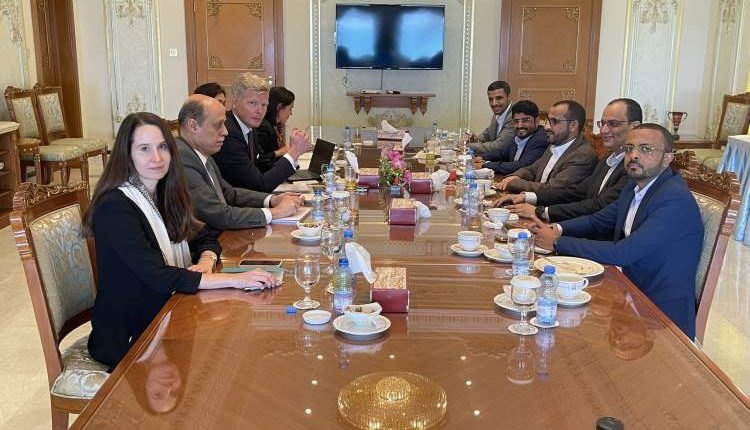National Delegation Meets UN Envoy to Yemen, Discussing UN-sponsored Truce Obstacles
The head of the National Delegation, Mohammad Abdulsalam, Tuesday, met with the UN envoy to Yemen to discuss the course of the UN-sponsored truce and the obstacles and complications it faces.
In a tweet, Abdulsalam said that during the meeting, they discussed the course of the humanitarian and military truce and the obstacles and complications it faces, in addition to the importance of disbursing the salaries of the state employees.
He added, “We stressed to the envoy the importance of disbursing salaries throughout the country, and the Chairman of the Military Committee and the Governor of the Central Bank of Yemen participated with us in the meeting.”
Earlier, The Minister of Finance reiterated the readiness to allocate the revenues of fuel tankers in Hodeidah to pay the salaries of all state employees in the event that the other party committed to cover the impotence in the amount of salaries in accordance with the Stockholm Agreement.
In a statement, Minister Rashid Abu Lahoum confirmed that the Salvation Government is committed to supplying all revenues from fuel tankers to the Central Bank branch in Hodeidah Governorate, according to the agreement with the United Nations.
Dr. Abu Lahoum renewed demand for the United Nations to implement what was agreed upon mentioning the oil and gas revenues that are looted by US-Saudi mercenaries to cover the payment of salaries in all governorates, as this is a right guaranteed to all state employees.
He explained that the Salvation Government, eight months after the Stockholm Agreement, unilaterally and under the direction of the Chairman of the Supreme Political Council, opened an account at the Central Bank branch in Hodeidah in August 2019, in implementation of what was agreed upon after the other party’s procrastination in this regard.
The Deputy Prime Minister for Economic Affairs accused the US-Saudi aggression and mercenaries of repudiating the salary-disbursement agreement from the first moment of signing the agreement with flimsy justifications, calling on the United Nations to do its duty in this regard.
Earlier, Head of Supreme Political Council, Mahdi Al-Mashat, confirmed that port of Hodeidah revenues are allocated in favor of state employees’ salary so that forces of US-Saudi aggression cover the deficit from oil and gas revenues.
He stressed that the US-Saudi aggression and its mercenaries must fulfill their obligations towards the deficit in covering the salaries of state employees as it has been agreed to.
In early April, the UN special envoy for Yemen, Hans Grundberg, announced the nationwide ceasefire, for the first time since 2016, saying the two-month truce would be eligible for renewal with the consent of parties. The truce meant to halt all military operations in the country and to bring the foreign military invasion to an end.
UN Secretary-General Antonio Guterres said the truce “must be a first step to ending Yemen’s devastating war,” urging the warring parties to build on the opportunity to “resume an inclusive and comprehensive Yemeni political process.”
The deal stipulates halting offensive military operations, including cross-border attacks, and allowing fuel-laden ships to enter Yemen’s lifeline al-Hudaydah port and commercial flights in and out of the airport in the capital Sana’a “to predetermined destinations in the region.”
The Saudi-led aggression continues to violate the truce by detaining new fuel ships, despite their inspection and obtaining permits from the United Nations, insisting on the closure of Sana’a Airport, as well as, the fires of the aggression side did not subside along the fronts, on the borders and inside. Shelling, reconnaissance, development and crawl, including a failed advance carried out by mercenaries towards Army and Popular Committee sites south of Marib.

